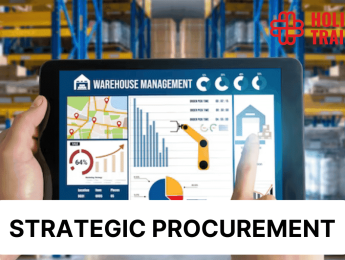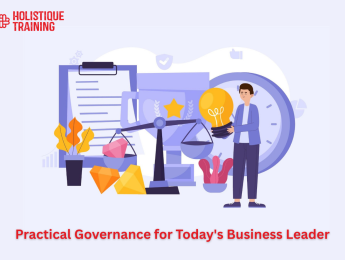- Table of Contents
- Introduction
- What Is organisational Leadership?
- The Growing Importance of Leadership in Today’s Workplace
- The Rising Demand for Skilled Leaders
- Why Formal Leadership Training Matters
- 9 Reasons to Enroll in an organisational Leadership Course
- 1. Build Strategic Thinking and Visionary Leadership
- 2. Enhance Communication and Influence Skills
- 3. Improve Emotional Intelligence and Self-Awareness
- 4. Learn to Lead Diverse and Inclusive Teams
- 5. Strengthen Conflict Resolution and Decision-Making Abilities
- 6. Understand organisational Behavior and Culture
- 7. Gain Practical Tools for Change Management
- 8. Increase Career Advancement Opportunities
- 9. Join a Network of Like-Minded Professionals
- How to Choose the Right Leadership Course for You
- Conclusion
Introduction
In today’s dynamic and competitive business world, the role of leadership has expanded far beyond traditional supervision and task delegation. Modern organisations are in constant motion—adapting to new technologies, market demands, and societal shifts. In such an environment, strong leadership is no longer optional; it is essential. Whether you are leading a small team, managing a department, or aspiring to executive roles, your ability to influence, guide, and empower others will determine your success and the success of your organisation.
Leadership is not just about authority—it’s about vision, communication, empathy, and decision-making. Unfortunately, many professionals are promoted into leadership roles without the necessary preparation, leading to inconsistent performance and organisational stagnation. That’s where formal leadership education becomes valuable. organisational leadership courses are designed to build the practical and emotional intelligence skills needed to lead effectively and ethically in complex environments.
From strategic thinking and emotional intelligence to managing diversity and leading change, leadership courses provide essential knowledge for professionals at all levels. They also help individuals become more self-aware, better communicators, and more confident decision-makers. In today’s knowledge-driven economy, where teams are often remote, multicultural, and fast-paced, such competencies are indispensable.
In this article, we will explore the meaning of organisational leadership, its growing importance in today’s workplace, and the increasing demand for skilled leaders. We’ll also examine why formal leadership training is so impactful, how to choose the right course for your goals, and we’ll conclude by summarizing 9 compelling reasons to enroll in an organisational leadership program.
What Is organisational Leadership?
organisational leadership is a management approach that emphasizes aligning people, values, and goals to drive organisational success. It is not limited to top executives—anyone in a leadership position or aspiring to become a leader can benefit from understanding how to lead within an organisational context. The focus is on influence, not control; on empowerment, not command.
At its core, organisational leadership combines various disciplines such as psychology, business management, communication, ethics, and strategic planning. Leaders in this field are expected to inspire trust, promote collaboration, and deliver results through a mix of soft and hard skills. The role of an organisational leader includes setting a clear vision, aligning the team’s efforts, navigating change, resolving conflicts, and maintaining a healthy culture.
Unlike traditional leadership, which might rely heavily on authority, organisational leadership is about guiding people toward a shared purpose. It’s about building meaningful relationships, leveraging individual strengths, and adapting to organisational needs. This type of leadership promotes a participative and inclusive work environment, where all voices are heard and respected.
Leadership in an organisational context also involves understanding systems and structures—how decisions affect not just immediate teams but the organisation as a whole. Leaders must think in terms of long-term impact, not just short-term gains. As organisations become more complex and interconnected, the ability to lead within that complexity becomes a distinct and vital skill.
In summary, organisational leadership is the ability to guide individuals and groups toward achieving a common mission, while promoting values like integrity, accountability, and innovation. It is a skill set that empowers professionals to become more than just managers—they become change agents, mentors, and visionaries.
The Growing Importance of Leadership in Today’s Workplace
The workplace has undergone a significant transformation in recent years. Hybrid work models, digital disruption, and global competition have reshaped how teams operate and how companies grow. In this new reality, leadership is one of the most sought-after and indispensable assets an organisation can have.
Leaders today are expected to wear many hats: strategist, motivator, communicator, and crisis manager. They must balance business goals with employee well-being, all while navigating uncertainty. Companies that once focused only on technical skills are now prioritizing leadership capabilities, recognizing that effective leadership directly impacts employee engagement, retention, and performance.
Moreover, younger generations entering the workforce demand more than just job security—they want meaning, inclusion, and inspiration. Leaders must be equipped to meet these expectations and create environments where innovation and growth flourish. Poor leadership, on the other hand, can result in toxic culture, high turnover, and stalled progress.
Simply put, organisations can no longer afford to have unprepared or outdated leaders. The future belongs to those who can lead with purpose, clarity, and adaptability.
The Rising Demand for Skilled Leaders
Across industries—from healthcare and education to tech and finance—there is a growing need for leaders who are not only competent but agile and empathetic. The rise of global teams, AI integration, and ESG (Environmental, Social, and Governance) initiatives has added layers of complexity to leadership roles.
However, there’s a concerning gap between the leadership skills employers need and those available in the workforce. This gap creates opportunities for professionals willing to invest in leadership training and distinguish themselves.
organisations want leaders who can handle ambiguity, inspire performance, and guide teams through transformation. As a result, leadership training is no longer a luxury or reserved for executives—it’s a necessity for anyone looking to advance.
Why Formal Leadership Training Matters
Many professionals assume that leadership is learned solely through experience. While on-the-job learning is important, it often lacks structure, feedback, and exposure to modern leadership frameworks.
Formal leadership training provides a structured path to mastering essential leadership competencies. These include:
Competency | Description |
Strategic Thinking | The ability to see the big picture, anticipate future trends, and create long-term plans. |
Emotional Intelligence | Understanding and managing your own emotions and those of others to lead with empathy. |
Communication & Public Speaking | Delivering clear messages, actively listening, and presenting ideas with confidence. |
Team Building & Conflict Resolution | Creating strong, collaborative teams and resolving disputes constructively. |
Decision-Making Under Pressure | Making informed, timely decisions even in high-stress or uncertain situations. |
Change Management | Leading organisations through transitions and helping teams adapt to change effectively. |
Ethical Leadership | Making principled decisions and setting a moral example for others in the organisation. |
In addition, training offers access to real-world case studies, interactive simulations, peer discussions, and mentorship—all of which accelerate your development. It also helps participants unlearn outdated habits and adopt research-backed practices for leading teams effectively.
In short, structured courses bridge the gap between potential and performance. They fast-track your leadership journey and prepare you to meet the challenges of today’s workplace with confidence.
9 Reasons to Enroll in an organisational Leadership Course
1. Build Strategic Thinking and Visionary Leadership
organisational leadership courses focus on developing your ability to think beyond short-term goals. You’ll learn how to assess complex situations, create strategic plans, and lead with a long-term perspective. This skill is essential for anyone who wants to guide teams or entire organisations toward sustainable success. Strategic thinking helps you see the bigger picture and anticipate future challenges.
2. Enhance Communication and Influence Skills
Great leaders don’t just give orders — they communicate clearly, listen actively, and inspire others to follow. Leadership programs teach essential communication techniques, including negotiation, public speaking, active listening, and giving constructive feedback. You’ll also learn how to tailor your message to different audiences and situations, making you more persuasive and influential.
3. Improve Emotional Intelligence and Self-Awareness
According to research from Harvard Business Review, emotional intelligence (EQ) accounts for nearly 90% of what sets high performers apart from their peers. Leadership courses place a strong emphasis on self-awareness, empathy, and emotional regulation. You’ll gain a deeper understanding of your strengths and weaknesses, how your behavior affects others, and how to lead with authenticity and empathy.
4. Learn to Lead Diverse and Inclusive Teams
Modern organisations are increasingly diverse — culturally, generationally, and ideologically. Effective leadership means being able to manage and empower a wide range of individuals. Courses often cover topics like inclusive leadership, unconscious bias, and cultural intelligence. You’ll learn how to create safe environments where everyone can contribute and thrive, which is key to innovation and retention.
5. Strengthen Conflict Resolution and Decision-Making Abilities
Leaders are constantly required to make tough decisions and resolve conflicts in high-pressure situations. Leadership training introduces you to frameworks and models that improve your decision-making skills under uncertainty. You’ll also learn techniques to manage disputes constructively and create solutions that satisfy everyone involved — all while maintaining team morale and trust.
6. Understand organisational Behavior and Culture
A good leader doesn’t only manage individuals — they shape and sustain the entire organisational culture. Courses in organisational leadership give you tools to analyze company culture, influence employee engagement, and align teams with the organisation’s core values. Understanding how systems, structures, and culture interact helps you become a more effective change agent within your organisation.
7. Gain Practical Tools for Change Management
According to McKinsey, 70% of organisational change initiatives fail, often due to poor leadership. In a world where change is constant — from digital transformation to global disruptions — you need the skills to guide teams through transitions. Leadership courses teach practical change management strategies and how to navigate resistance, communicate vision, and sustain momentum.
8. Increase Career Advancement Opportunities
Investing in a leadership course can significantly boost your resume and set you apart from other candidates. Employers recognize the value of formal leadership training, especially when combined with real-world experience. Whether you’re aiming for a promotion, switching industries, or starting your own business, a leadership certification can open doors to new opportunities and higher salaries.
According to a Forbes study, professionals with leadership training are 30% more likely to be promoted within a year of completing a course.
9. Join a Network of Like-Minded Professionals
One of the underrated benefits of leadership courses is the opportunity to connect with peers, instructors, and industry leaders. These networks can provide mentorship, job referrals, business partnerships, and long-term friendships. Sharing experiences with others who are also striving to grow as leaders can provide inspiration, accountability, and support throughout your career.
How to Choose the Right Leadership Course for You
Selecting the right leadership course depends on your goals, experience level, and learning preferences. Here are a few practical tips to guide your decision:
- Assess Your Career Stage: Are you an emerging leader or a seasoned professional? Choose a course that matches your current level but pushes you to grow.
- Define Your Goals: Do you want to improve communication, manage change, or develop strategic vision? Look for courses with a clear focus on your target skills.
- Check the Curriculum: A good program should cover leadership theory, practical application, and soft skills like emotional intelligence.
- Look at Format and Flexibility: Online or in-person? Full-time or part-time? Pick a format that fits your schedule and learning style.
- Research Accreditation and Reviews: Ensure the course is offered by a reputable institution and read participant feedback for real insights.
Ultimately, the best course is the one that equips you with both knowledge and confidence to lead with purpose.
Conclusion
Leadership is no longer about titles—it’s about action, influence, and responsibility. As the business world grows more interconnected and complex, the need for well-prepared leaders becomes even more urgent. organisational leadership courses offer a practical and transformative pathway to becoming the kind of leader today’s world needs.
Through this article, we explored what organisational leadership means, why it’s increasingly important, and how formal training helps professionals build critical skills. We also shared guidance on how to choose a course that fits your career goals.
If you’re ready to unlock your leadership potential, influence positive change, and accelerate your career, now is the time to act. Enroll in our organisational leadership course today and start leading with confidence, clarity, and impact.


























